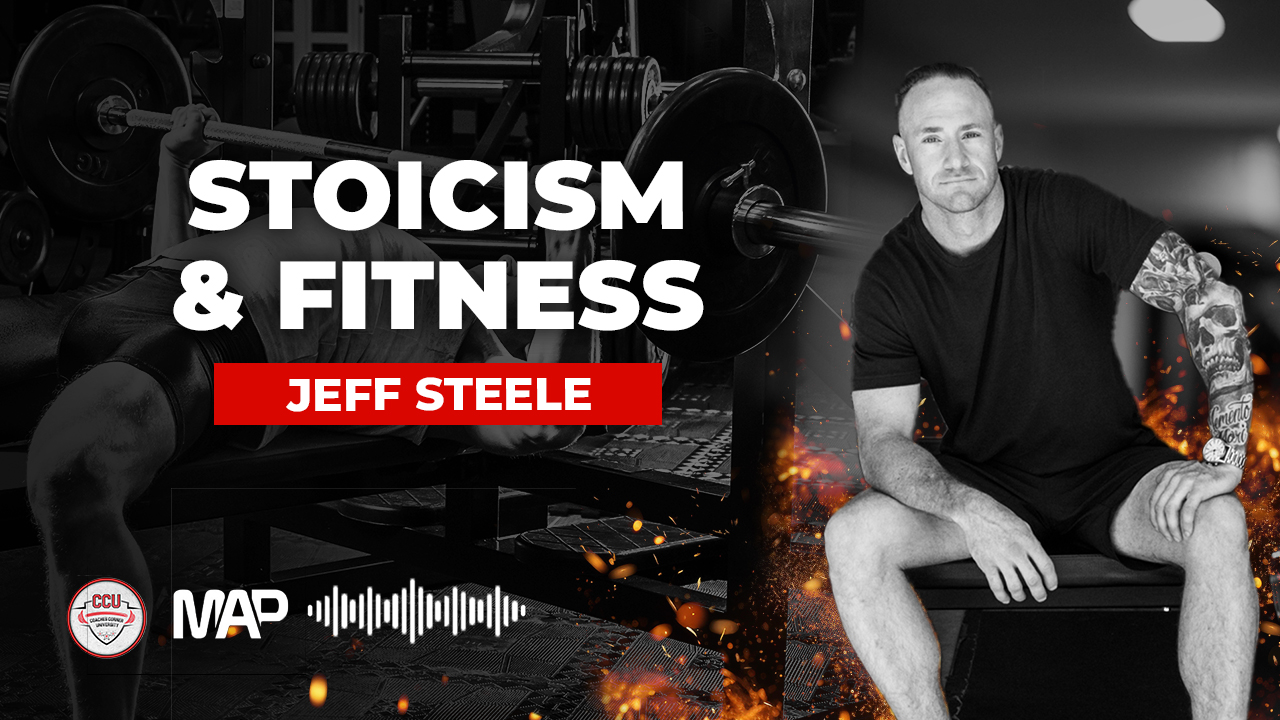Discover The Latest Blogs
Stay updated with Our Informative Blog Posts

CCU Podcast - Stoicism and Fitness with Jeff Steele
Stoicism and Fitness
Podcast
Today I sat down with Jeff Steele, the Founder/CEO of The Memento Mori Project. His clothing line is more than clothing; they offer a mindset. Their apparel is designed not only to be comfortable and aesthetically pleasing, but also to remain a constant reminder of how you live your life and to inspire others just the same. Jeff is not only a business owner but also a 37-year-old firefighter in Southern California, married to his best friend, Sasha. Together, they share a passion for health, fitness, and growing in every aspect of life.
I had a powerful conversation with Jeff, who's turned profound loss into a philosophy for living fully. Jeff's journey from losing his older brother in a motorcycle accident to building a brand around purposeful living offers lessons every coach needs to hear. This wasn't your typical tactical training discussion. This was about the foundation underneath everything we do—understanding ourselves, managing our emotions, and architecting lives that align with our values.
10 Key Takeaways from Stoicism and Fitness
Control What You Can Control—Everything Else Is Noise
Jeff shared how his father always told him he was his own worst enemy, but he didn't understand how to fix it until discovering stoicism. The Marcus Aurelius quote that changed everything for him: "You have power over your mind, not outside events. Realize this and you will find strength." As a firefighter who drives past his brother's accident site while responding to calls, Jeff had to learn to separate what demands his energy from what simply demands acceptance. He can't control that tragedy happened, but he can control how he shows up for his job and his life every single day.
The Four Stoic Virtues Are Your Operating System
Jeff breaks down the four virtues that guide his life: wisdom (pursuit of knowledge and knowing things), courage (bravery in the face of adversity—not just physical bravery, but being brave enough to fight back when shit's not good), justice (doing the right thing), and temperance (self-control and moderation, because it's easy to get sucked into anything from video games to drugs that will wreck your life). What makes Jeff's approach powerful is his recognition that none of these virtues are accessible without presence. You can't be wise when you're disconnected. You can't be brave when you're dissociated. These aren't abstract philosophical concepts for Jeff—they're practical frameworks for making better decisions.
Memento Mori: The Ultimate Accountability Tool
Jeff explained that Memento Mori—"remember that you must die"—isn't cynical. It's the original YOLO, but not reckless. Losing his brother at age 31 forced Jeff to examine how his brother lived: dirt biking in Costa Rica, traveling to Italy and Tulum, snowboarding, living like there was no tomorrow. Jeff realized he wanted to travel, do awesome things, and live the way his brother did. This became the catalyst for him to travel to Europe, Australia, and Whistler, start his business, and pursue experiences he'd been putting off. Jeff was so hesitant to start his social media page and brand, but he realized he wasn't living up to the memento mori mindset if he didn't just do it. So he did.
Discipline Becomes Identity When It Stops Requiring Effort
Jeff distinguishes between motivation and discipline, recognizing that motivation gets you started but discipline keeps you going. He's brutally honest about the areas where he's disciplined and the areas where he's not. His approach is about recognizing what needs to be fixed and reflecting on it. Jeff believes that eventually, discipline transcends effort—it just becomes who you are. You're not someone who practices discipline; you're someone who is disciplined. The behaviour becomes automatic because it's aligned with your identity.
Anger Protects Until It Destroys
Jeff opened up about being "a very angry person for one reason or another" and how stoicism helped him develop temperance. He recognizes that at some point, anger was likely a positive adaptation that protected him from something. But continuing to operate from that place became unhealthy and destructive. For Jeff, the work isn't suppressing the emotion—it's understanding it, giving yourself grace for feeling it, taking a deep breath for a mental reset, and then choosing how to respond before you do something you can't take back. Jeff goes to therapy every two weeks and credits it with giving him unbiased feedback and tools to improve. In his profession as a firefighter, talking about therapy is taboo, but he does it anyway because it works.
Saying No Is Self-Ownership
Jeff shared how his wife was stressed about missing a girls' night to prepare for her business event. His advice to her: "Just don't go." All the other women dropped out, too. Nobody was mad. Jeff's philosophy is clear: you don't have to please anybody. You don't have to show up for anybody but yourself. You need to show up for yourself because if you don't, someone else is going to own you. He learned through experience that saying no is a skill. When you're younger, you say yes because you don't want to miss out next time. But the people who really give a shit about you—that small core group—will never judge you for protecting your energy and priorities.
Step Back Before You're Too Deep in the Hole
Jeff explained how you can get caught up in situations—work environments, home environments, toxic relationships—and things slowly devolve into a hole you don't realize you're in until you're too deeply into it. He's experienced this in the past few years, where toxic people around him made him lose his edge. The pride of "not giving up" kept him stuck, but Jeff realized there's no giving up or running away when it comes to protecting yourself—you really just have to give a shit about yourself. Stepping back and asking, "I'm not me. I haven't been myself lately. Why?" is critical for catching these patterns before they consume you.
Your Friend Circle Gets Smaller—And That's How It Should Be
Jeff observed that your friend group shrinks as you get older—from your early twenties to your mid-20s to your 30s, it keeps getting smaller. But the whole time, the people who really gave a shit were just this small group right here. These are the people who will never go anywhere, no matter what you say or do, as long as you live by good values. They won't judge you for not going out last time or not drinking with them. They respect you for who you are and what you do. Jeff's point: narrowing down to those core people who share your values means they're never going anywhere. If you narrow it down to these people, they're your foundation.
Non-Negotiables Must Align With Your Values
Jeff's wife talks about "non-negotiables"—the things you will not compromise on daily or weekly. For Jeff, one is understanding and using his wife's love language, which is acts of service. Coming home from work in the morning and making sure the dishwasher is empty, the house is cleaned up, or the dog has been walked—these acts of service are his non-negotiables because they align with what matters most to him. Jeff believes these non-negotiables define what you're truly disciplined in. If he can integrate that type of discipline into his life and make it non-negotiable, it will make his wife happier and solidify the relationship. These aren't random habits—they're tied directly to priorities and values.
The Most Important Moments Won't Register on a Calendar
Jeff reflected on how the small moments with his brother—learning to snowboard when his brother told him "you just have to commit," riding horses behind the Hollywood sign, watching him roll up on his Harley in cowboy boots—became the memories that defined their relationship. His brother lived his life as if there were no tomorrow, and at one point, there wasn't. Jeff chose the date of our podcast intentionally—it was precisely 12 years to the day his brother died. He used to get really bummed out around this time, but he's grown to not only accept what happened but also see the silver lining. The most critical moments in life aren't the significant calendar events—they're the present, seemingly mundane experiences that only become significant in retrospect.
Jeff's message through the Memento Mori Project is simple but profound: stop existing, start living. He took the worst thing that ever happened to him and turned it into a philosophy for living fully.
Find Jeff
Website -https://themementomoriproject.com/
Instagram -https://www.instagram.com/the.memento.mori.project/
Find the Podcast

Coaches Corner PhD




